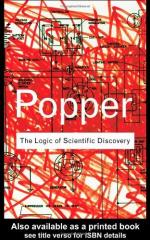
|
| Name: _________________________ | Period: ___________________ |
This quiz consists of 5 multiple choice and 5 short answer questions through Part II: Chapter 4, Falsifiability.
Multiple Choice Questions
1. How does logic serve in determining if a statement is testable?
(a) It sets up criteria.
(b) It creates provability.
(c) It creates understanding.
(d) It does nothing.
2. What does the principle of causality say about all events?
(a) They can be deductively predicted.
(b) They must be falsifiable.
(c) They must use previous assumptions.
(d) They can in inductively predicted.
3. What is one approach to knowledge considered by Popper?
(a) Inductive.
(b) Purposive.
(c) Common sense.
(d) Accidental.
4. What should guide the methods of testing scientific statements?
(a) Logic.
(b) Psychology.
(c) Physics.
(d) Epistemology.
5. From what does a theoretical system arise?
(a) Universal statements.
(b) Contradictions.
(c) Conventions.
(d) Axioms.
Short Answer Questions
1. How are theories used to explain the world?
2. What does Popper consider existential statements to be?
3. What does Popper feel is a fruitless exercise?
4. For what purpose are methodological rules developed?
5. What confuses the distinction between universal and individual names?
|
This section contains 176 words (approx. 1 page at 300 words per page) |

|




